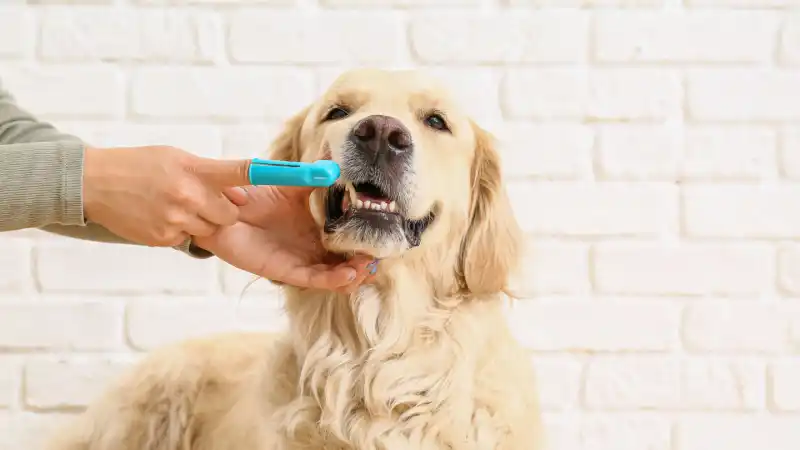Home Remedies for Dog Constipation
Constipation is a common health issue that can cause much discomfort in dogs. Discover these 8 effective dog constipation remedies that can be relieved at home.

Even though constipation is uncomfortable for your pup, it's a common health problem that affects many dogs. From not enough fiber in the diet to stress and lack of exercise, constipation can come on quickly and for a variety of reasons.
Luckily, most cases of constipation in dogs are short-lived, and you can easily treat your dog's constipation at home. Read on to learn the signs that your pup is constipated and 8 effective ways to relieve their constipation at home.
How to Know if Your Dog Is Constipated
Your dog's normal bowel movement pattern may differ depending on the type of food they eat, their activity level, and their current health. But typically, dogs will have at least one bowel movement each day.
If your dog is attempting to go multiple times during the day unsuccessfully, this is a key sign that they're constipated.
Other common signs that you may see include:
Circling excessively
Scooting, or dragging their bottom on the ground
Squatting frequently
Decreased appetite
Vomiting
Small amounts of watery feces
Weight loss

Every Dog and Cat Deserves the Pet Insurance of Champions
Get prize-winning care for your pets.
8 Dog Constipation Home Remedies
If your dog is struggling with constipation, it's always best to check with a vet to rule out any serious health conditions that may be causing constipation.
Once you've ruled out any serious health concerns, these at-home remedies can effectively relieve your dog's constipation.
1. Pumpkin Puree
Pumpkin offers many great health benefits for your pup, but the high soluble fiber content is what makes it so effective for treating constipation. Fiber helps to regulate your dog's digestive tract, and the moisture content in the pumpkin can also help soften their stool.
The Merck Veterinary Manual recommends adding 1-4 tablespoons with your dog's meal to help ease constipation. If your dog ever struggles with diarrhea, pumpkin is also helpful in those cases.
Make sure to always buy 100% pumpkin puree and never pumpkin pie filling. Pumpkin pie filling contains added sugar and spices that can be harmful to your dog.
2. Exercise
Sometimes, your dog's digestive system just needs a little stimulation.
Adding an extra walk or more playtime to your dog's daily routine can help move stool through the digestive tract and down to the colon. Daily exercise is also a great way to keep your dog's digestive system functioning regularly.
3. Olive Oil
Olive oil is another ingredient that can offer your pup a variety of health benefits, from moisturizing their skin to helping protect against cancer.
A small amount of olive oil added to your dog's food can help lubricate their digestive system, making it easier for your dog to pass stool – like a DIY stool softener!
Only use a small amount of olive oil, however. Using too much oil or giving it too frequently can lead to diarrhea in your pup.
4. Coconut Oil
Similar to olive oil, coconut oil can also act as a natural stool softener for your dog. Adding a tablespoon or two to your dog's food can help lubricate the digestive tract.
Coconut oil also has anti-bacterial and anti-microbial properties that can help improve your dog's gut health and promote healthy digestion. Constipation also often goes hand-in-hand with inflammation, and coconut oil is a natural anti-inflammatory.
5. Increased Water Intake
One of the most common causes of constipation is dehydration. Without enough water and moisture in your pup's diet, there's no way for them to lubricate their stool.
If your dog is constipated, make sure they have access to plenty of fresh, clean water at all times. You can also add water or broth to their daily meals to encourage more hydration, especially if your dog doesn't go for their water bowl as often as you'd like.
If the weather is warm, a couple of ice cubes as treats can also encourage your dog to drink more water.
6. Canned Dog Food
Another great way to add more moisture and hydration to your dog's diet is to switch to canned food, even if it's only temporary.
Canned food naturally has more moisture than traditional kibble, and the change in food can also help increase your pup's appetite if constipation has suppressed it.
Switching your dog's food abruptly can lead to other digestive issues, so always make the shift in phases. Try adding the canned food in with their dry food at first and then switch to strictly canned food after your dog's system has had a chance to adjust.
7. Apple Cider Vinegar
Many pet owners swear by apple cider vinegar as a way to help their pup with a wide range of health issues. Apple cider vinegar is a natural probiotic, which helps promote healthy gut bacteria and improve your dog's digestive system.
The taste of apple cider vinegar can be off-putting to some dogs, so try just a small amount in their water bowl. You can also try yogurt or a small amount of chopped fermented vegetables if your dog isn't a fan of apple cider vinegar.
8. Leafy Greens
Leafy greens like kale or spinach are high in fiber and can help regulate your dog's digestive system. You can mix them straight into your dog's regular meals or add them to DIY dog treats.
Other great, high-fiber foods you can give your dog include:
Broccoli
Raspberries
Blueberries
Kelp
Apples
Carrots
Green beans
Shiitake mushrooms
When to See a Veterinarian About Your Dog's Constipation
While a day or two of constipation is common for dogs and easily treatable at home, prolonged constipation can lead to further health complications and can be a sign of an underlying health condition.
Long-term or chronic constipation can lead to obstipation and other issues with your pup's colon. Constipation can also be a sign of serious health issues, like hypothyroidism, enlarged prostate, and renal issues.
If your dog hasn’t passed a bowel movement in over 48 hours, it’s time to visit your vet. They will be able to give you a more specific diagnosis and determine the best course of treatment for your four-legged friend. They may also recommend additional testing, like X-rays or an abdominal ultrasound, to rule out other potential health issues.
Treating dog constipation doesn't have to be difficult – there are plenty of simple, effective home remedies that can help get your pup back on track. Just make sure to keep an eye on your dog's overall health and visit the vet if constipation persists or you have any concerns.
AKC Pet Insurance’s Accident and Illness plan for dogs (underwritten by Independence American Insurance Company) can provide coverage for diagnostics and treatment related to canine digestive issues.

Every Dog and Cat Deserves the Pet Insurance of Champions
Get prize-winning care for your pets.

Richard has shared his life with pets since childhood, and currently has a rescue cat and dog. He works with veterinarians and pet businesses to improve their content. To find out more, please visit his [website](https://richardrowlands.com/).
READ MORE ARTICLES

